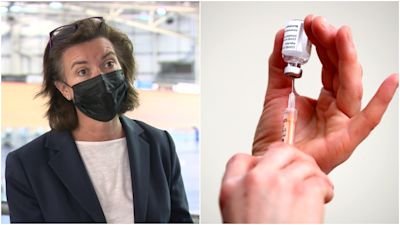Covid vaccine: Health minister pushing for booster rollout as 'protection wanes after six months'

Video report by ITV Wales reporter Siôn Jenkins
The Covid booster vaccine rollout is "ready to go" as soon as the Welsh Government is given the "green light", the health minister has said.
It comes after a report found the protection provided by two doses of the Pfizer/BioNTech and the Oxford/AstraZeneca coronavirus vaccines starts to wane within six months.
A reasonable worst-case scenario could see Covid-19 protection fall to below 50% for the elderly and healthcare workers by winter, latest analysis from the Zoe Covid study indicates.
But Eluned Morgan, Minister for Health in Wales, says the results of the study were "no real surprise."
"This is in line with our expectations," she told ITV Wales.
"We always knew that there may be a possibility that immunity would wane over time, particularly amongst the elderly population, and that's why we are ready in Wales with our programme to give a booster dose - in particular starting with those older people within our communities to give them the additional protection that they may need going in to the winter."
The scientist leading the vaccine study said waning protection is to be expected and that plans for booster jabs need to be made "urgently".
It stated that the Pfizer jab was 88% effective at preventing Covid infection a month after the second dose - but after five to six months the protection decreased to 74%, suggesting protection fell 14 percentage points in four months.
With the AstraZeneca vaccine, there was a protection against infection of 77% one month after the second dose.
After four to five months protection decreased to 67%, suggesting protection fell by 10 percentage points over three months.
Despite all health boards in Wales being "ready to roll out" the additional booster vaccine - they must wait for the green light to be given from the Joint Committee on Vaccination and Immunisation (JCVI).
Ms Morgan said: "We have been pushing to get this rollout done as soon as possible - we are ready to go.
"We have been requesting from the JCVI that they come forward with their advice as soon as possible because all our health boards are ready to roll this additional booster vaccine out.
"But we think it's sensible to wait for the clinical and scientific and data driven advice as we have done throughout the pandemic.
The health minister added that ideally the Covid booster vaccine would be rolled out at the same time as the flu vaccine as "we are expecting an increase in the incidents of flu this autumn and winter".
The Zoe Covid study drew on more than 1.2 million test results and participants.
While protection appears to decrease steadily, individual risk may vary due to individual variation in antibody duration, researchers say.
Across the UK, vaccines were rolled out among the older and the most vulnerable in society along with health workers before rolling out vaccines to younger age groups across the UK.
This means the majority of people who had their second dose five to six months ago will be older or considered vulnerable due to other health reasons.
This suggests these people are now likely to be at increased risk of Covid-19 compared to those vaccinated more recently.
Researchers say that in order to confidently illustrate how vaccine effectiveness changes over time in different age groups, more data is needed over a longer period of time.Professor Tim Spector, lead scientist on the Zoe Covid Study app, said: “In my opinion, a reasonable worst-case scenario could see protection below 50% for the elderly and healthcare workers by winter.
“If high levels of infection in the UK, driven by loosened social restrictions and a highly transmissible variant, this scenario could mean increased hospitalisations and deaths.
“We urgently need to make plans for vaccine boosters, and based on vaccine resources, decide if a strategy to vaccinate children is sensible if our aim is to reduce deaths and hospital admissions.
“Waning protection is to be expected and is not a reason to not get vaccinated.
“Vaccines still provide high levels of protection for the majority of the population, especially against the Delta variant, so we still need as many people as possible to get fully vaccinated.”